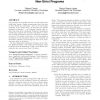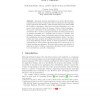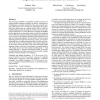1932 search results - page 105 / 387 » A Functional Quantum Programming Language |
118
click to vote
ICFP
2003
ACM
16 years 2 months ago
2003
ACM
Lazy programs are beautiful, but they are slow because they build many thunks. Simple measurements show that most of these thunks are unnecessary: they are in fact always evaluate...
156
click to vote
WOA
2003
15 years 4 months ago
2003
— This paper describes a research experiment carried out at the University of Catania, aiming at testing and evaluating the applicability of the Erlang language in programming mu...
226
click to vote
POPL
2006
ACM
16 years 3 months ago
2006
ACM
Functional programmers often reason about programs as if they were written in a total language, expecting the results to carry over to non-total (partial) languages. We justify su...
112
click to vote
ECOOP
1999
Springer
15 years 7 months ago
1999
Springer
Abstract. Automatic program specialization can derive efficient implementations from generic components, thus reconciling the often opposing goals of genericity and efficiency. Thi...
103
click to vote
ICFP
2008
ACM
16 years 2 months ago
2008
ACM
The increasing availability of commodity multicore processors is making parallel computing available to the masses. Traditional parallel languages are largely intended for large-s...



